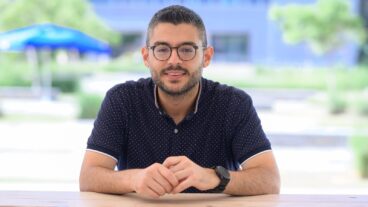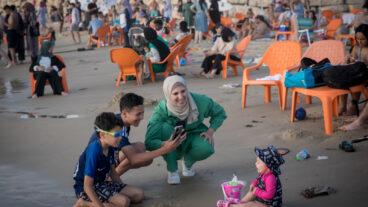It’s not always easy, but Israeli Chagit Rubinstein is determined to help Bedouin women living in the Negev raise their standards of living with a microfinance fund.
A Bedouin woman who wants to start a sheep dairy has just received the 1,000th small-business loan granted by SAWA, a unique microfinance program in Israel.
Chagit Rubinstein, a native Israeli, created SAWA (“together” in Arabic) modeled on Grameen Bank, which provides collateral-free group loans to rural Bangladeshis. “I had a dream to create microfinance for the poorest populations in Israel,” Rubinstein tells ISRAEL21c.
Born on a kibbutz, the Fulbright Scholar earned her MBA in France, worked in export companies in Israel, and then studied microfinance at American University in Washington, DC.
Through Koret Israel Economic Development Funds (KIEDF), a non-profit established in 1994 by the Koret Foundation of San Francisco to stimulate economic development and employment in the private sector, she returned home to Israel to establish the country’s only micro-credit program.
SAWA is one of several micro-enterprise initiatives funded by KIEDF. Supported by foundations and donors in Europe and North America, KIEDF has facilitated more than $200 million in financing to some 7,300 mostly female novice entrepreneurs, and also offers training and mentoring.
Focusing on the Bedouin
“Microfinance services for low-income populations are usually connected with creating an income-generating activity,” Rubinstein explains.
Given the similarities between the Bedouin communities of Israel’s south and the Bangladeshi villages where Grameen operates, she decided to concentrate her efforts on this population.
The program took root slowly. For six months, Rubinstein commuted from her home in the northern port city of Haifa to the communities of the south, seeking connections through organizations and individuals.
She recruited the help of Nuzha el-Huzail, a Bedouin social worker with a PhD from Ben-Gurion University.
“I realized that a Jewish-Israeli coming to a Bedouin village by herself wasn’t the right way to do it,” she says. “I had my first meetings in Segev Shalom, near Beersheva, only after I hired Nuzha as program manager in March 2006.”
A long road to win trust
Still, the two women met with suspicion. “It took a long time to get their trust,” Rubinstein says of the local women. “They couldn’t believe we would really give them money.”
After five months of meetings, they got a dozen people to give the program a try. Because charging interest is problematic among religious Muslims, Rubinstein had to eliminate interest payments and introduce a fixed participation fee instead. And because the society is strictly male-dominant, every participant had to have the approval and support of a father, brother, husband, or son.
“We once came to a neighborhood and a man came out and said, ‘Go away.’ That’s not the common reaction, but the men usually are skeptical and don’t believe their women can really do something profitable,” says Rubinstein.
To date, more than $1 million has been lent to 60 women through SAWA grants of $1,000 to $2,500. Since its inception, 2.6 percent of loans have defaulted, well below the worldwide five percent average in microlending.
Many of the recipients already had rudimentary businesses or retail ideas. Daycare centers, bakeries, convenience stores, hair salons, and clothing boutiques are some of the SAWA-facilitated enterprises currently up and running. According to el-Huzail, most recipients are aged between 23 and 40.
Changing attitudes, and lives
“There is no doubt that SAWA is changing attitudes,” el-Huzail says.
It is also changing lives. “We see big changes in how [participants] dress, talk, and look,” Rubinstein says.
One woman used her SAWA loan to replace her old manual sewing machine with a second-hand electric machine and to purchase an electrical system to power it. After she paid back that loan, she used a second loan to open a store where she sells the clothes she makes.
“Now, three years after she started, she is opening another store in Beersheva that her daughter will run,” says Rubinstein.
Rubinstein hopes to expand the project to other disadvantaged populations, including Ethiopian immigrants.
“Microfinance is already thriving in places like Jordan and Ramallah,” says Rubinstein. “I hope that once its success is proven here, we can establish it in other sectors of Israeli society.”













